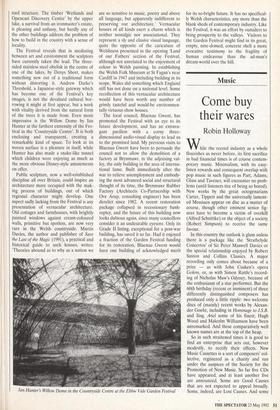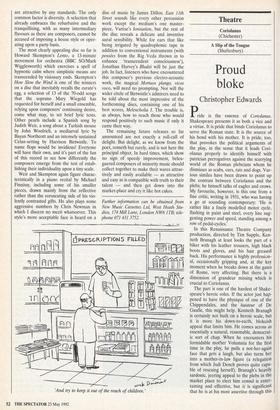Music
Come buy their wares
Robin Holloway
While the record industry as a whole flourishes as never before, its first sacrifice in bad financial times is of course contem- porary music. Minimalism, with its easy- listen rewards and consequent overlap with pop music in such figures as Part, Adams, Glass and Tavener, will encounter no prob- lems (until listeners tire of being so bored). New works by the great octogenarians Carter, Tippett and the universally lament- ed Messiaen appear on disc as a matter of course, though other eminent senior fig- ures have to become a victim of overkill (Alfred Schnittke) or the object of a society (Robert Simpson) to receive the same favour.
In this country the outlook is glum unless there is a package like the 'Strathclyde Concertos' of Sir Peter Maxwell Davies or the special relationship enjoyed by Robert Saxton and Collins Classics. A major recording only comes about because of a prize — as with John Cusken's opera Golem, or, as with Simon Rattle's record- ing of Nicholas Maw's Odyssey, because of the enthusiasm of a star performer. But the 60th birthday (recent or imminent) of three differently distinguished composers has produced only a little ripple: two welcome discs of (mainly) recent works by Alexan- der Goehr, including in Hommage to J.S.B. and Sing, Ariel some of his finest; Hugh Wood and Malcolm Williamson have been unremarked. And these comparatively well known names are at the top of the heap.
So in such straitened times it is good to find an enterprise that sets out, however modestly, to rectify their effects. New Music Cassettes is a sort of composers' col- lective, registered as a charity and run under the auspices of the Society for the Promotion of New Music. So far five CDs have appeared, and at least another five are announced. Some are Good Causes that are not expected to appeal broadly. Some, indeed, are Lost Causes. And some are attractive by any standards. The only common factor is diversity. A selection that already embraces the rebarbative and the tranquillising, with as many intermediary flavours as there are composers, cannot be accused of imposing a house style or oper- ating upon a party basis.
The most clearly appealing disc so far is Howard Skempton's Lento, a 13-minute movement for orchestra (BBC SO/Mark Wigglesworth) which exercises a spell of hypnotic calm where simplistic means are transcended by visionary ends. Skempton's How Slow the Wind is one of the winners on a disc that inevitably recalls the curate's egg, a selection of 13 of the 70-odd songs that the soprano Mary Wiegold has requested for herself and a small ensemble, relying upon composers' continuing desire, come what may, to set brief lyric texts. Other pearls include a Spanish song by Judith Weir, a song about a Turkish mouse by John Woolrich, a mediaeval lyric by Sayan Northcott and an intensely sustained Celan-setting by Harrison Birtwistle. To name flops would be invidious! Everyone will have their own, and it's part of the fun of this record to see how differently the composers emerge from the test of estab- lishing their individuality upon a tiny scale.
Weir and Skempton again figure charac- teristically in a piano recital by Michael Finnissy, including some of his smaller pieces, drawn mainly from the reflective rather than the coruscating side of his vio lently contrasted gifts. He also plays some aggressive numbers by Chris Newman in which I discern no merit whatsoever. This style's more acceptable face is heard on a
disc of music by James Dillon. East 11th Street sounds like every other percussion work except the medium's one master- piece, Varese's Ionisation, but the rest of the disc reveals a delicate and inventive aural sensibility. While for ears that like being irrigated by quadrophonic tape in addition to conventional instruments (with pensees from the Rig Veda thrown in to enhance 'transcendent consciousness'), Jonathan Harvey's Bhakti will be just the job. In fact, listeners who have encountered this composer's previous electro-acoustic work, the magical Mortuos plango, vicos voco, will need no prompting. Nor will the wider circle of Birtwistle's admirers need to be told about the most impressive of the forthcoming discs, containing one of his best scores, Melencholia I. The trouble is, as always, how to reach those who would respond positively to such music if only it came their way.
The remaining future releases so far announced are not exactly a roll-call of delight. But delight, as we know from the poet, cometh but rarely, and is not here the principal object. In hard times, which show no sign of speedy improvement, belea- guered composers of minority music should collect together to make their wares attrac- tively and easily available — as attractive and easy as is compatible with truth to their talent — and then get down into the market-place and cry it like hot cakes.
'And try to keep it out of the reach of children.'



































































 Previous page
Previous page